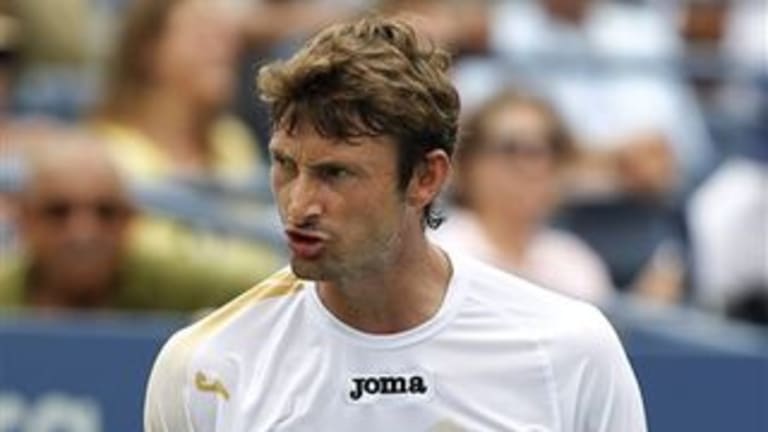So what are the chances that you go 0-for-your-first-13 break points and still end up winning a best-of-three set tennis match? Not very good—unless the guy on the other side of the net is Mikhail Youzhny or someone with an equally unstable game.
Juan Carlos Ferrero can tell you all about that today, after he clinched a 7-6 (4), 6-4 first-round win over Youzhny in the Shanghai Masters by finally punching through to win a break point, finishing the evening 1 for 14. He got his money's worth, too, as it was a match point. And here's the kicker: Ferrero didn't even have to touch to ball to clear that massive break-point hurdle. Youzhny served up a double-fault on what was the third match point. You want to talk about an ugly match? Of course!
You might have expected something like this from two veterans who have, well, "issues." Ferrero is a former No. 1 and the French Open champ of 2003, but he more or less evaporated for long periods shortly after making his biggest statement—and ultimately, Rafael Nadal emerged and eclipsed him. Ferrero is presently ranked No. 68, is 31 years old, but appears to be getting. . . younger. Youzhny is 29 and seemingly playing sloppier tennis than ever—if that's even possible. It's a tribute to Youzhny's enormous talent that he can play so casually that you'd swear his mind is permanently occupied in an alternate universe but still hold a No. 34 ranking.
Both men were coming off a good week to add a little zest to this intriguing first-rounder; they each reached the quarters of Beijing, where Youzhny lost to one of those Boys of Autumn, Ivan Ljubicic, while Ferrero went down to top-seeded Jo-Wilfried Tsonga. Ferrero was looking to build on a 3-1 career head-to-head advantage on Youzhny.
It was pretty clear by the sixth game of the first set that this was going to be a screwy one. Ferrero fended off three break points while serving at 1-2 (two of those courtesy of unforced errors), and in the next game earned six break points of his own in the next game. But Youzhny stood fast, aided considerably by Ferrero errors, as the Spanish's pro's game basically deserted him in a marathon deuce.
Granted, Youzhny was doing some nice work with his big serve, particularly out wide. And he showed no fear as he loaded up and hit winners to get himself out of jam after jam. But each time he reached safe haven, he seemed to forget that he wasn't quite finished. I guess he needed to be in crisis to marshal the appropriate degree of interest—a condition that lasted throughout the entire match; it may be the most striking way that Youzhny shows his age.
After those two break-point laden games yielded absolutely no progress for either man, they settled into a hold-hold pattern until the tiebreaker, in which Ferrero was just a hair steadier and craftier. The key—and only—mini-break went to Ferrero when Youzhny's reliable backhand misfired to give the Spaniard a 5-4 lead with two serves to come. Ferrero won both points to take the set.
Both men played slightly tighter tennis in the second set, but try as he might, Ferrero just couldn't do much with his break points. And it was partly because Youzhny lifted his game in those moments. Break point No. 7, 8, 9. . . they went rolling by, one after another, and by the time Ferrero was 0-11 it seemed that if Youzhny could just convert one of the rare break points he had on Ferrero's serve (a total of four for the match), basic psychology would take care of the rest. You just aren't supposed to win when you've blown 13 such chances.
But in the end, Ferrero's steadier hand—and nerve—prevailed. There were no breaks until Youzhny served at 4-5. After saving one match point with an overhead and another with an inside-out forehand approach winner, he hit the costly double fault that ended the match.
Stat of the match: Youzhny made 54 unforced errors, to 19 by Ferrero.
—Pete Bodo
